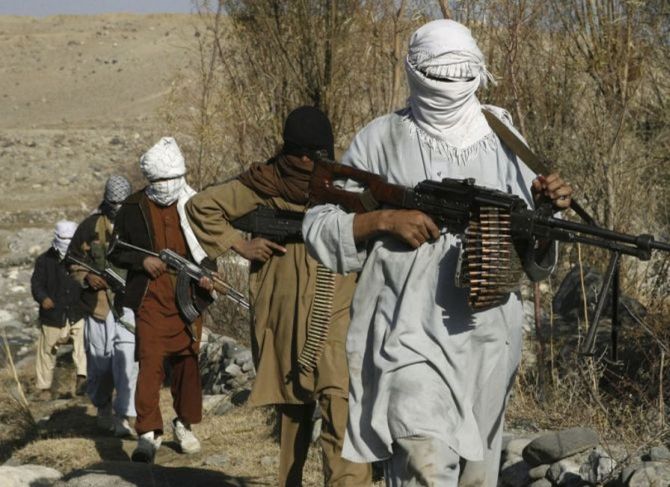Asserting that terrorism is the biggest challenge the region is facing, India on Monday criticised Pakistan for using it as an 'instrument of state policy', and called upon the Shanghai Cooperation Organisation (SCO) to combat the menace collectively and enforce internationally recognised legal statutes to comprehensively eradicate safe havens, infrastructure and financial networks supporting terrorism.

In an address at the Council of Heads of Government meeting of the eight-member SCO, Vice President Venkaiah Naidu said the most important challenge faced by the region is terrorism, particularly cross-border terrorism, and that India remained concerned about threats emerging from ungoverned spaces as well.
"Terrorism is truly the enemy of humanity. It is a scourge we need to collectively combat. We remain concerned about threats emerging from ungoverned spaces and are particularly concerned about states that leverage terrorism as an instrument of state policy. Such an approach is entirely against the spirit and ideals and the charter of the SCO," he said at the virtual meet hosted by India.
Naidu did not name Pakistan directly during his address.
He said elimination of this threat will help the countries realise shared potential and create conditions for stable and secure economic growth and sustainable development.
He also called upon SCO member states to enforce internationally recognised legal statutes to comprehensively eradicate safe havens, infrastructure and financial networks supporting terrorism, a statement issued by Naidu's office said.
In another indirect reference to Pakistan, the Vice President criticised attempts to bring bilateral issues into the SCO by blatantly violating its well-established principles and norms of charter safeguarding the sovereignty and territorial integrity of the member states.
"Such acts are counterproductive to the spirit of consensus and cooperation that define the SCO as an organisation," he said.
In mid-September, India's National Security Advisor Ajit Doval walked out of a virtual meeting of top security officials of the SCO member states after the Pakistani representative projected a map that inaccurately depicted Kashmir.
India hosted the meet for the first time after it got full membership of the influential grouping in 2017.
The council of heads of government is the second highest forum of the SCO after the annual summit of the top leaders of the grouping.
India's representation at the SCO council of heads of government has often been at the level of a cabinet minister.
Last year, Defence Minister Rajnath Singh attended it in Uzbekistan.
Talking about the importance of collective efforts to overcome the coronavirus crisis and its adverse impact, the vice president said, "Our hope is pinned on trade and investment as an engine of reviving growth and driver of economic recovery."
"For trade to play its part in the recovery process, all the partners must be trustworthy and transparent," he said adding that nations must demonstrate their compliance with multilateral rules of trade.
At the same time, he said economic growth and trade can only operate in an environment of peace and security.
"Peace is the essential prerequisite for progress."
He said India was emerging as an economic force at the global level and the country's gross domestic product was expected to reach $5 trillion by 2025.
"With more than 1 billion mobile subscribers and over 600 million internet users, India has the potential to emerge as one of the largest digital ecosystems in the world," he said.
"However, the unprecedented COVID-19 pandemic has slowed down the economic trajectory of all member states. India has bravely fought the global pandemic and has shown remarkable resilience in fighting the virus as well as in ensuring economic stability," he said.
The vice president also underlined the need for a reformed multilateralism that gives voice to all stakeholders, addresses contemporary challenges and puts human beings at the center of the policies.
"To ensure stable economic growth, we have launched a new economic strategy: Atmanirbhar Bharat or Self-reliant India. It prioritises building the national economic strength, resilience and enhanced capacities to be a trusted partner and a responsible global player," he said.
"It recognises the importance of reciprocity, transparency and fairness in the context of trade. It is gratifying that the Indian economy is steadily moving on the path of recovery," Naidu added.
The vice president also congratulated SCO trade ministers for approving the action plan for the implementation of the program of multilateral trade and economic cooperation for 2021-2025.
Naidu asserted that India was committed to taking its cooperation within SCO to a new height by playing a proactive, positive and constructive role in the grouping.
In his address, the vice president said that India has proposed to create a special working group on startups and innovation that will lay the foundation for multilateral cooperation among the SCO member states to develop their startup ecosystems.
He also mentioned India's second proposal to create an expert group on traditional medicine.
The vice president also talked about the government's 'Sabka Saath Sabka Vikas (together with all, development for all)' approach. He also said India was celebrating the 551st birth anniversary of Guru Nanak, who gave the world a timeless message of peace, charity, co-operation and mutual respect.
"These are the quintessential Indian values that also underpin SCO's vision of peace and progress," he added.










